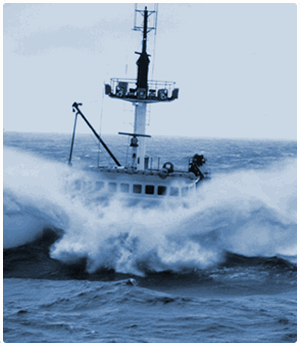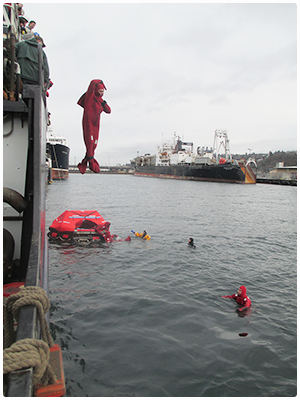Links to USCG & Government Agencies
Coast Guard Links
National Maritime Center – The National Maritime Center (NMC) is the USCG’s mariner licensing authority and issues credentials to mariners. The NMC’s website contains instructions and checklists for applying for a Merchant Mariner Credential. Forms, applications, and other resources can be found on the site.
www.FishSafe.info – Commercial fishing industry vessel safety website for information related to all aspects of fishing.
Alaska 17th District Marine Safety Office
Coast Guard Regional Exam Centers – Information and links to local Coast Guard Regional Exam Centers (REC) regarding applications and licensing. Online REC appointments can also be made here.
Coast Guard Sector Puget Sound
Marine Safety and Environmental Protection
Merchant Mariners: Exam Questions/Approved Schools
Current CG Safety Training Requirements Q & A
TWIC website – A Transportation Worker Identification Credential (TWIC) is basically an ID card. More information is available at this site. To find locations of enrollment centers, go to the TWIC FAQs page. You can also pre-register and facilitate the process for a smaller fee. Note: you will not be able to obtain, retain, or renew your license without a TWIC.
USCG Homeport – Here’s an easy way to check the status or your or your employee’s merchant mariner application online. Click on the “Merchant Mariners” link on the left side of the page, then click “Merchant Mariner Application Status,” then enter the mariner number and application ID, or the last name, last four digits of SSN, and date of birth.
USCG Coast Pilot – Coast Pilots are now being published privately, but they can be viewed and downloaded at this link.
USCG License Exam Questions – This site offers actual exam questions from the U.S. Coast Guard Captains License Exam Database. It is a good resource if you are preparing for CG examinations.
Code of Federal Regulations – The complete CFR is available at this link.
Gross Tonnage Calculation – This is a CG-generated gross tonnage calculation program that you can use to determine the gross tonnage of your vessel. It is simple to use and does the calculations automatically after you plug in the specifications.
National Vessel Documentation Center – This site gives information concerning your documented vessel.
Knot Tying – This is a great site for learning knots.
Coast Guard Forms
Download USCG Notice of Arrival Form – Email the completed form to: sans@nvmc.uscg.gov )
USCG 2692 Casualty Reporting Forms
Download Ballast Water Reporting Form (Federal form also accepted by WA Dept of Fish & Wildlife). Submit completed forms to: NBIC@BALLASTREPORT.ORG (federal) and waballast@aol.com (state)
Government Agencies
Federal Agencies
Index of Navigation & Vessel Inspection Circulars (NVIC)
NMFS (National Marine Fisheries Service)
NTSB (National Transportation Safety Board)
NWS Alaska (National Weather Service)
NWS Seattle (National Weather Service)
OSHA (Occupational Safety and Health Administration)
State Agencies
Marine Exchange of Puget Sound
Vessel Traffic Service (Puget Sound)

USCG STCW
The Standards of Training, Certification, and Watchkeeping of Seafarers 1978 (STCW) is an international convention which sets qualifications and training standards for licensed masters, engineers and watchkeeping personnel serving aboard seagoing merchant ships.

Overview
On October 1, 1991 the US became signatory to the 1978 convention and had five years to implement the STCW. Beginning October 1, 1996 the USCG began issuing 1978 STCW forms to currently licensed officers and seaman based solely on the strength of their U.S. licenses and documents.
However, beginning February 1, 1997 all countries signatory to the 1978 convention are now required to enforce additional training requirements imposed by the 1995 amendments to the 1978 rules. The new training requirements include but are not limited to:
- Completion of training record books assessing one’s practical skills.
- Completion of approved courses in:
- Basic Training (BT) includes four modules: personal survival techniques, fire prevention and firefighting, elementary first aid and personal safety and social responsibilities. The STCW BT requirements are contained in Reg. VI/1 of the STCW Code. BT is required for those persons serving in a position that must be filled as part of the required crew complement or assigned a responsibility on the muster list.
- Bridge Resource Management
- Survival Craft
- Automatic RADAR Plotting Aids (ARPA)
- Global Marine Distress and Safety System (GMDSS)
As required by the 1995 amendments, all 1978 forms expired on January 31, 2002. Therefore it is of utmost importance that both companies and individual mariners comply with the new rules so they may obtain the 1995 STCW forms required for service beyond the US boundary line.
In addition, all mariners whose sea service began on or after August 1, 1998 must fully comply with the 1995 training requirements at this time. For more information, visit the Coast Guard’s STCW website at www.uscg.mil/stcw or call Seattle’s OCMI at (206) 217-6115.
STCW Basic Training
(5 days) $1320 members | $1350 non-members | Class Schedule
Classes are held at NPFVOA offices, a local fire simulator and a local pool.
Personal Safety & Social Responsibility (4 hrs)
- Complying with Emergency Procedures
- Taking precautions to Prevent Pollution of the Marine Environment
- Observing Safe Working Practices
- Understanding orders and Being Understood in Relation to Shipboard Duties
- Contributing to Effective Human Relationships on Board Ship
Personal Survival Techniques (12 hours)
- Principles of Survival at Sea Preparing for Emergency Situations Lifesaving Equipment
- Evacuation Helicopter Assistance Distress Signals
- Emergency Radio Equipment
Medical Emergencies at Sea (8 hours)
- Scene Assessment Bloodborne Pathogens/Infectious Diseases
- Patient Assessment at Sea Vital signs
- Shock Life Threatening Conditions
- Toxic Environment Hypothermia
- Medevac Practical Exercises
Basic Firefighting (16 hours)
First day of class is 8 hours at NPFVOA which covers:
- Theory of Fire Fire Prevention
- Fire Detection Firefighting Equipment
- Ship Firefighting Organization Ship Firefighting Strategy and tactics
- Hands-on Field Exercises
Second day of class is 8 hours at a local fire simulator
- Field Exercises: Pump fire with dry chemical and water; car prop with carbon dioxide; trough fire with foam extinguisher.
- Burn Building Exercises: Maze with self-contained breathing apparatus; hotel search and rescue with SCBA; class A fire with all-purpose nozzle and applicator; class B fire with all-purpose nozzle and applicator.
Licensing Requirements
The Standards of Training Certification and Watchkeeping, 1978 (STCW) is an International Convention which sets qualifications and training standards for masters, officers, and watchkeeping personnel serving aboard seagoing merchant ships. In 1995 STCW was amended with several additional requirements, including a much higher level of training and proof of competency. (The full requirements can be found in 46 CFR Parts 10, 12, and 15.)
All commercial fishing and fish-tender vessels are exempt from STCW regardless of GRT; however, dedicated processors are not.
If you are in the process of obtaining, upgrading, or renewing a license and wish to have or are required to have an STCW-95 certificate, find out what training you are required to have before you begin attending expensive courses. The requirements are found in 46 CFR 10.205, 10.209, and manning sites 15.1101, .1103 and .1105.
Keep in mind that dedicated processors do not need STCW Basic Training (a 5-day USCG-approved course) if they prove compliance with the safety training requirements of 46 CFR Part 28 (Drill Instructor certification). Also, there are substitutions allowed for some of the requirements, and you may not be required to attend a particular course (i.e, ARPA, GMDSS, lifecraft proficiency) if your vessel does not carry such equipment.
- Commercial fishing and fish-tender vessels, although currently exempt until final ruling, are required by the FCC to carry GMDSS equipment. However, because fishing and fish-tender vessels are not subject to STCW, they need only meet the FCC licensing requirement. The current FCC licenses are issued after simply passing a test; whereas the full STCW GMDSS course is a 70-hour USCG-approved course. Do be aware, however, that any limitations or substitutions in training will be noted on your STCW certificate.
Medical Care Provider
STCW Medical Care Provider
Satisfies USCG Medical First Aid training requirements of Section A-VI/4 and Table A-VI/4-1 of the STCW Code and 46 CFR 12.13-1.
$1400 members $1500 non-members | Class Schedule
Medical first aid providers conduct a primary and secondary survey of a sick or injured crewmember, immobilize the patient, and begin immediate treatment to preserve life – typically done prior to seeking radio medical advice. This SCTW advanced course teaches the knowledge and skills to perform these duties effectively. Prerequisite: Basic Training Elementary First Aid. This course is taught by George Washington University’s Maritime Medical Access Program.
Hotel & Transportation Information
Please call for hotel information.
NPFVOA is nearest to bus routes D and 31. The metro bus routes and schedules are available online at http://metro.kingcounty.gov.
